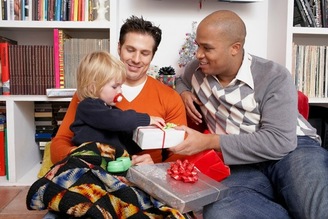LGBT+ at Christmas
Ellen Jones

Let’s face it, Christmas can be hard. The seemingly inescapable festivities can be stressful, exhausting and not as wonderful as everyone else seems to think they are. For LGBT+ people, this is especially true. Whilst it is perfectly possible to be LGBT+ and happily celebrate Christmas, there is no denying the fact that there are specific challenges associated with this time of year.
Christmas is one of the few times of year where families, particularly extended families, get together and celebrate. If an LGBT+ person is not ‘out’ to their family, this time of year can be very difficult as maintaining a false identity is a, quite frankly, gruelling process. And, even if a person is 'out’, this does not necessarily mean they are accepted. Intolerance, fuelled by the stress of the festive season, can provide the perfect breeding ground for hatred, a potentially more dangerous manifestation.
Jake, a friend of mine and openly bisexual university student, does not have a ‘particularly supportive’ family and returns home for Christmas, where he spends his time ‘predominantly hiding’ his sexuality. ‘My parents aren’t very accepting; I’m not allowed to tell any of my other family members. It’s exhausting, pretending to be something you’re not.’ For Jake, it is the family aspect that is difficult about Christmas, although as he remarks ‘at least they haven’t cut me off completely’.
Arguably, the most challenging part of Christmas is the unavoidable reminders of how you are supposed to be experiencing and feeling during the festive season. Rather, the issue with Christmas for many LGBT+ folk, even those from supportive families, is that the holiday brings to light many of the heteronormative and cisnormative attitudes (which presume everyone is heterosexual or cisgender respectively). Whilst these attitudes are prevalent throughout the year, it is to a lesser extent, whereas at Christmas they are made increasingly obvious until a pronounced, isolating feeling of otherness is created. Advertising would have you believe there is a ‘right’ way to celebrate Christmas, that there is a correct, idealised experience (need I mention the endless adverts depicting the ‘perfect’ Christmas dinner, party and gifts?). More often than not, that depiction is exclusionary towards LGBT+ families and thus, when LGBT+ people are excluded from even the fictional, happy Christmas scenario, the reality is an even more uncertain experience.
It isn’t all doom and gloom though; as I noted earlier, the LGBT+ Christmas experience can be very positive. And, even for those who find Christmas challenging, there is support. For example, in US, initiatives have been created where mothers volunteer to write letters validating LGBT+ youth. In the UK, there is an increasing array of support networks for LGBT+ people over the festive period.
We might not be able to change attitudes in time for Christmas, but it is at least a step in the right direction to at least recognise the issues faced LGBT+ people this December.
Christmas is one of the few times of year where families, particularly extended families, get together and celebrate. If an LGBT+ person is not ‘out’ to their family, this time of year can be very difficult as maintaining a false identity is a, quite frankly, gruelling process. And, even if a person is 'out’, this does not necessarily mean they are accepted. Intolerance, fuelled by the stress of the festive season, can provide the perfect breeding ground for hatred, a potentially more dangerous manifestation.
Jake, a friend of mine and openly bisexual university student, does not have a ‘particularly supportive’ family and returns home for Christmas, where he spends his time ‘predominantly hiding’ his sexuality. ‘My parents aren’t very accepting; I’m not allowed to tell any of my other family members. It’s exhausting, pretending to be something you’re not.’ For Jake, it is the family aspect that is difficult about Christmas, although as he remarks ‘at least they haven’t cut me off completely’.
Arguably, the most challenging part of Christmas is the unavoidable reminders of how you are supposed to be experiencing and feeling during the festive season. Rather, the issue with Christmas for many LGBT+ folk, even those from supportive families, is that the holiday brings to light many of the heteronormative and cisnormative attitudes (which presume everyone is heterosexual or cisgender respectively). Whilst these attitudes are prevalent throughout the year, it is to a lesser extent, whereas at Christmas they are made increasingly obvious until a pronounced, isolating feeling of otherness is created. Advertising would have you believe there is a ‘right’ way to celebrate Christmas, that there is a correct, idealised experience (need I mention the endless adverts depicting the ‘perfect’ Christmas dinner, party and gifts?). More often than not, that depiction is exclusionary towards LGBT+ families and thus, when LGBT+ people are excluded from even the fictional, happy Christmas scenario, the reality is an even more uncertain experience.
It isn’t all doom and gloom though; as I noted earlier, the LGBT+ Christmas experience can be very positive. And, even for those who find Christmas challenging, there is support. For example, in US, initiatives have been created where mothers volunteer to write letters validating LGBT+ youth. In the UK, there is an increasing array of support networks for LGBT+ people over the festive period.
We might not be able to change attitudes in time for Christmas, but it is at least a step in the right direction to at least recognise the issues faced LGBT+ people this December.